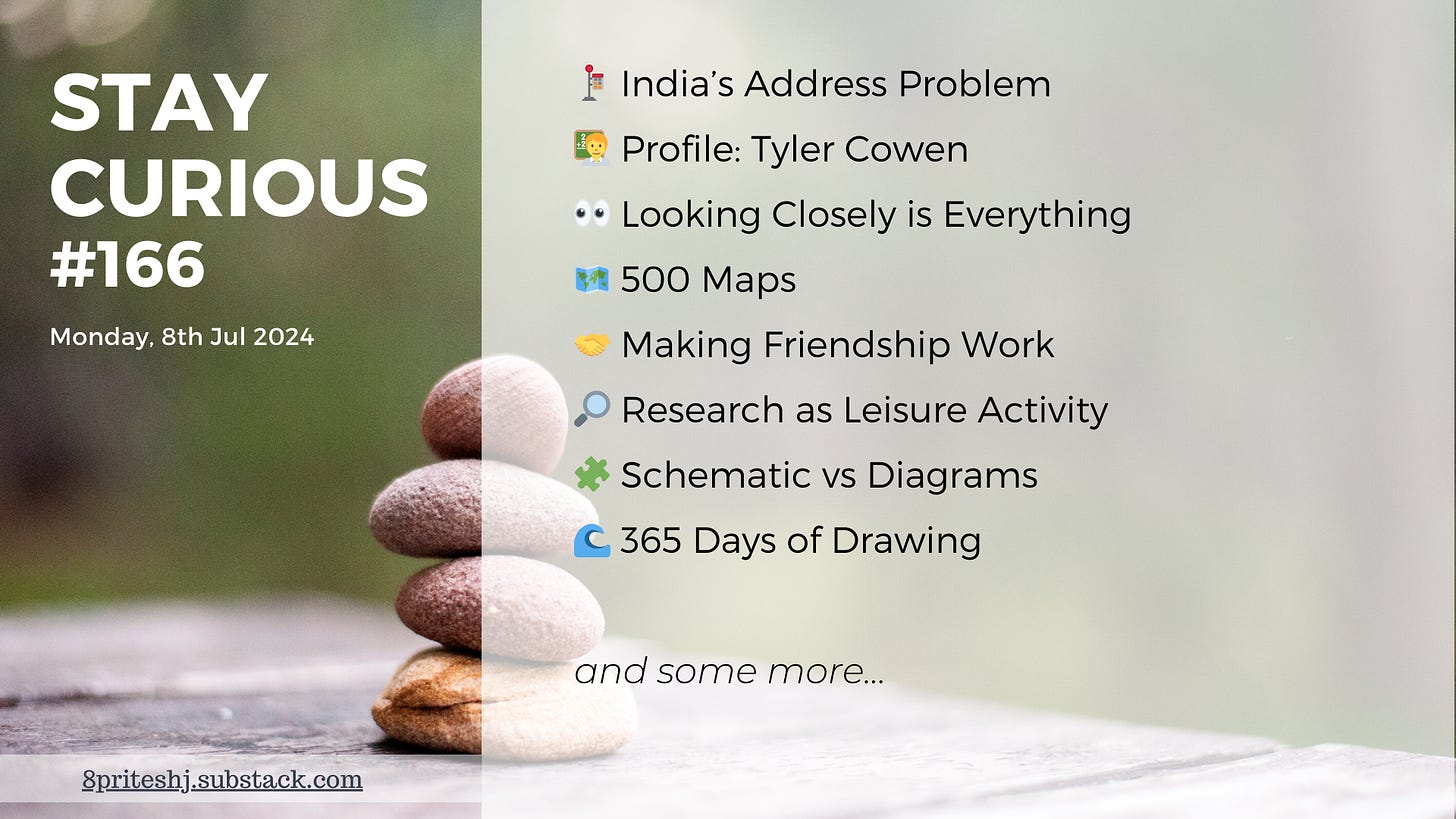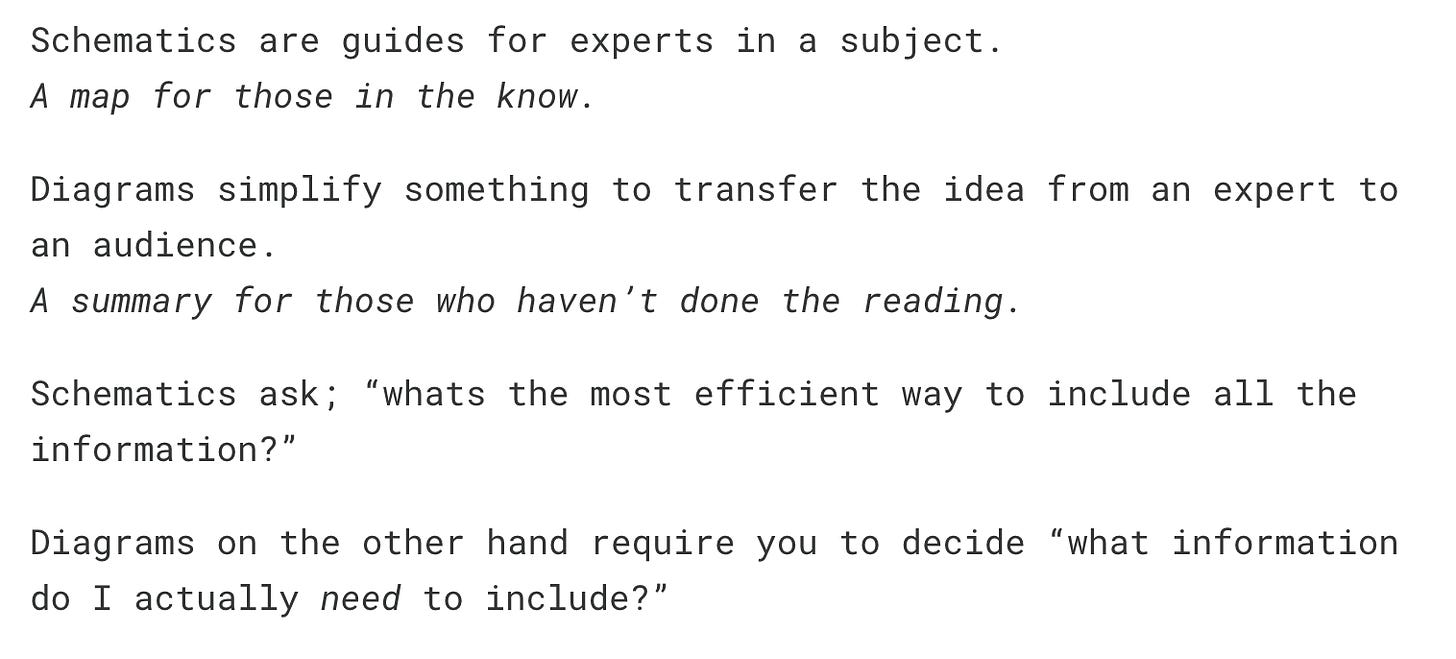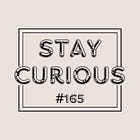📚 India’s Address Problem, Tyler Cowen, Looking Closely, Making Friendship Work
Research as Leisure Activity, Schematic vs Diagrams and more
Hi, this is post #166.
There is a certain flavour in today’s curation. There are many simple ideas, but they are tastefully cooked to perfection. These themes are more close to my heart than my brain. I found myself pausing to cherish the ideas better.
It’s a different spread, but worth your time & attention. I hope you like it. Here’s a quick outline:
And now, onto today's finds…
🚏 Sthaan - Solving India’s Address Problem
Addresses in India are a complex problem - there are no standards, and there is a lot of localized context which resides in the mind or practices of people living in every locality. If you’ve worked in the e-commerce or logistics field, you will know how painful & costly this problem is.
Sthaan is a project under People + AI initiative (by Nandan Nilkeni & team) and is looking to take this head on.
“Where are you?” outlines the broader problem & why it is critical to be solved. This charter document outlines the solution approach and current state of this work-stream.
I found this very interesting as the problem is relatable and the solution seems to be based on learning of existing efforts in DPI (digital public infrastructure) initiatives. The discussion in the charter documents is ongoing, and worth checking out.
🧑🏫 Profile: Tyler Cowen
Tyler Cowen’s work & feed has been a source of joyful learning for the last couple of years. He has diverse interests, acute observations and an always-learning approach. In Mario Gabriele’s words - “Tyler is, in my view, one of the most interesting living thinkers. He has an extremely broad aperture, a native understanding of the internet, and a differentiated perspective on nearly everything.”
Below are two articles profiling his ideas & work, they are worth reading.
Modern Meditations: Tyler Cowen. A conversation with Mario Gabriele covering a wide range of topics and some super interesting questions. One snippet:
Do something you’re bad at. For the past 55 years, Tyler has practiced shooting a basketball into a hoop. It’s a small act that he does not excel at but finds valuable. Practicing an activity where you have limited skill – especially if you have tremendous talent in another arena – teaches humility. Avoid limiting yourself to your zone of genius.
Tyler Cowen is the best curator of talent in the world. Tony Kulesa profiling his unique style of identifying talent thru his Emergent Venture Grant. One snippet:
“Recently, one of my favorite questions to bug people with has been “What is it you do to train that is comparable to a pianist practicing scales?” If you don’t know the answer to that one, maybe you are doing something wrong or not doing enough. Or maybe you are (optimally?) not very ambitious?”
👀 Looking Closely is Everything
Craig Mod’s “Looking closely is everything” is a beautiful read. And when I say beautiful, I mean it both figuratively and literally. He has expanded the idea of ‘looking closely’ and given us a sample object to taste it ourselves.
The point being: Looking closely is valuable at every scale. From looking closely at a sentence, a photograph, a building, a government. It scales and it cascades — one cognizant detail begets another and then another. Suddenly you’ve traveled very far from that first little: Huh.
I’d say that that huh is the foundational block of curiosity. To get good at the huh is to get good at both paying attention and nurturing compassion; if you don’t notice, you can’t give a shit. But the huh is only half the equation. You gotta go huh, alright — the “alright,” the follow-up, the openness to what comes next is where the cascade lives. It’s the sometimes-sardonic, sometimes-optimistic engine driving the next huh and so on and so forth.
This piece is like a meditation. Read it, absorb and re-read to absorb some more. I highly recommend this one.
🗺️ Should this be a map or 500 maps?
At the end of the 18th century, Spain's official geographer, Tomás Lopez, was asked by the King to create an accurate map of the kingdom. In an attempt to delegate the herculean labour required, Tomás drew a series of circles, picked the town in the center of each circle, and asked the local priest to answer a questionnaire and draw up a map of their province. The goal was to amalgamate the responses into a single map. But none of these priests were trained in cartography, and many of them would have had limited access to maps at all.
What happens next will blow your mind!
Well not so much, yet Elan Ullendorff has a great way to complete that story & then use it to share some lessons.
I'm obsessed with this story because it gets at a dynamic embedded within everything designed that we rarely think about. Once you notice it, it is present in almost every conversation, at every aperture and zoom level: modularity is inversely correlated to expressiveness.
I loved this post, not just for this story (and its explanations) but other things that Elan covers. Tiny little goodness that makes chasing such posts worth the effort.
🤝 Making Friendship Work
Anne Helen Petersen is working on a new book project - Friend Group, which is all about the various ways that we build community and enduring friendship amidst a cultural obsession with optimization and individualism.
In the post titled “How people are making friendship work *right now*” she covers some of her early insights after talking to a lot of friend groups.
She has listed some interesting and useful observations, I am sharing up a couple of them below:
Routine > Calendar Madness
If these parents had to coordinate to find a time every month, it would never happen. But the predictability of it — the fact that it is set on their schedule, the same way a holiday or a dentist appointment is — makes it happen.
Make it happen
You don’t have to love logistics like me and Tom to make friendship happen. You just have to stop kicking the can down the road. More to the point: when you meet someone who seems like the sort of person you’d like to hang out with again, you can’t just say “we should get coffee sometime!” and then nod furiously when the other person says “I’d like that!” When you reach that point of agreement, that’s when you nail down a date and time and place, even if it means taking out your phones and looking at your dorky calendars. Grab the momentum and run with it.
🔎 Research as Leisure Activity
Celine Nguyen’s “research as leisure activity” offers two useful takeaways:
What is research? She takes a view of all kinds of research (non-academic included) to come up with a working definition:
Research as a leisure activity includes the qualities I described above: a desire to ask and answer questions, a commitment to evidence, an understanding of what already exists, an output, a certain degree of contemporary relevance, and a community.
How “research as a leisure” powers a lot of curious folks to create things that power new discoveries & joyful learning.
This one is a ‘food for thought’ piece. I loved the way Celine creates a framework-ish definition based on her observations.
🧩 Schematic vs Diagrams
Alex Morris’s StratScraps newsletter dished out a phenomenal one recently. Here’re one bit that stood out: Schematics vs Diagrams
Unnecessary syntax is another brilliant snippet trying to define various terms that get used in context of process regularly: Procedure, Routine, Method, Workflow, Protocol, System, Operation, Practice, Sequence, Technique.
Brilliant stuff!
✨ Everything else
Kristen Meyer creates flat lay photographs on pastel backgrounds with precisely arranged vegetables, crackers, and other organic materials like rocks and leaves. Creativity has no bound.
Ryan Todd’s 365 days of drawing delivers a witty collection of inventions, and some thought-provoking observations. You can see them all here.
‘I’m good, I promise’: the loneliness of the low-ranking tennis player. “We were a strange cohort: sharing courts, canteens and coaches around the world but remaining ultimately alone.”
⏰ In case you missed last week’s post, you can find it here.
That's all for this week, folks!
I hope I've earned the privilege of your time.
If you liked this post, please hit the ❤️ below, leave a comment or share with someone who will find it useful too. It’s highly encouraging.







Really resonated with the "looking closely" snippet. This ties in well with an idea I had recently when traveling in Kyoto that the nature of our universe (and I use that grandiose term for everything we do including our lives) is that it is fractal. The closer you look at something, a whole new universe opens up and on and on. It's not even something metaphysical. It is as simple as our brains are the ultimate filtering mechanisms - they are very good scoping our area and then presenting us stimuli from that and when we look closely, they start rescoping your perceived universe into that little thing.